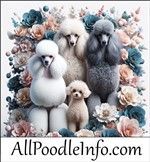When a Poodle Eats Feces (Coprophagia)
Overview
There are few behavioral issues more frustrating than when a Poodle puppy or dog starts to eat his or her own feces. This is known as coprophagia (pronounced cop-pro-feedge-ia) and a Poodle of any age and any variety may start doing this for seemingly no reason.
This is a tricky topic since it quite common for dogs to do this, however finding accurate information as to why this is done and importantly, how to stop it is often difficult to navigate.
For this reason, our goal is to discuss this in detail, sort through the facts and end with helpful, accurate advice you can take to stop your Poodle from eating poop.
We’ll cover:
- Why Poodles do this – separating myth and fact
- If eating feces is dangerous
- Medical conditions that can trigger coprophagia
- A list of tips and home remedies products to stop coprophagia, along with how well these do or do not work.
Please note:
AllPoodleInfo is reader-supported, and some of the product suggestions on this page are affiliate links. As an Amazon Associate we earn from qualifying purchases. This is at no extra cost to you and helps us continue providing free, high-quality information.
Why Poodles and Other Dogs Eat Feces
As with most issues revolving around this topic, there is no one clear answer, however there is a short list of possible reasons. If your Poodle is eating poop, the answer as to why will fall into one of these categories.
As a food source
– This may seem odd if you feed your Poodle on a regular basis and perhaps your puppy or dog does not even finish all of the food in his bowl, so how could he be hungry enough to eat poop?
The answer here may be the element of the quality of food that he is ingesting. Some foods contain a lot of fillers. Fillers are empty ingredients of no or very little nutritional value. It is added to a slew of cheaper (and well-known) dog food brands meant to plump up the food to make it appear as if the food is dense and hiding the fact that it is contains ‘fillers of nothingness’.
It is very cost effective for the manufacturer and unknowing pet owners feed their Poodles a food that contains only 3/4 or even less of actual real food.
For this reason, a Poodle may be eating plenty, however his body is not receiving enough nutrients. Canines instinctively scavenge for what they need and this can lead a Poodle to either eat grass or eat feces (either his own or that of another dog). Though a dog will not ingest many nutrients from his own poop if his diet is lacking in the first place, feces of other dogs (if they are fed a high quality food) may indeed offer a trace of what his body needs.
Another element is that with low-quality brands, a good portion may be indigestible, passing right through the body. Since the feces then contains what was in his bowl, the Poodle may ingest it all over again.
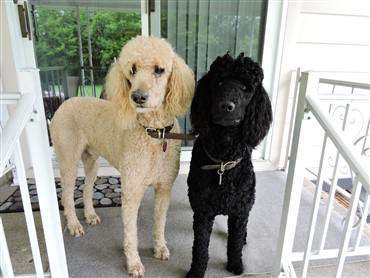
King Tut & Caesar
Photo courtesy of Marcia Skinner-Harris
We’ll go into more detail ahead, however the fix for this is to reassess what the Poodle is being given not just for main meals but for snacks too and to ensure that a high quality food is being offered.
Behavioral issue
– A lot of different elements fall under the category.
Let’s first go through some behavioral myths and why these theories do not hold much weight:
1. Disposing of evidence.
Though it may appear that some Poodle eat their own feces in an attempt to cover up the ‘deed’, there is little evidence to back up this theory. In extreme circumstances in which an abusive owner reacted terribly to a dog having a bowel movement inside, this might be the case. However, in normal, loving households, a dog would have no instinct or forward thinking abilities to do this.
2. Mimicking.
Others will suggest that a puppy is copying the behavior of his dam. It is true that many dams will ingest the feces of their newborn puppies. This is an instinctual canine behavior
of dogs that have just given birth and are taking care of their litter. By the time a puppy is 3 weeks old, he is becoming more independent of the dam. By 5 and 6 weeks, he is spending much more time playing with his littermates and the dam has stopped eating the feces.
It is a stretch to say that a puppy will have been cognizant enough to have noticed this being done when he was so very young and it is even more of a stretch to assume that and an 8-week old Poodle puppy would even have the ability to remember this.
Now let’s look at some of the behavioral issues that may indeed led to coprophagia:
1. Boredom.
If a Poodle is left alone for a good amount of time and does not have enough toys (chew, companion, treat release) to keep himself busy, he may end up sniffing at and then nibbling at his own feces. It is really a matter of a dog being by himself for such a length of time that all toys have been inspected and chewed, all food has been eaten, naps have been taken, he’s barked himself out…and at some point this leads him to examine what’s left in his area (his poop). A few nibbles lead to a bite and if time keeps ticking by, eventually he may consume enough that owners notice when they arrive back home.
2. Stress.
This is closely related to the boredom-inducing coprophagia issues. In these cases, a Poodle will eat his own feces when he is home alone and experiencing separation anxiety. Confined to one area and experiencing distress, he may act quite erratic. It is not uncommon for a stressed dog to pace, bark, whine, bang against walls, tear things up, chew at non-toy objects and, it is theorized, eat his poop.
3. Misperception.
There are some theories that a dog may inadvertently be taught to think that feces is something to get excited about and to ‘grab’. This makes sense to some degree. Dogs can be taught to know when something should be ‘wanted’. If a dog poops inside and an owner than speaks in an excited, loud voice, runs to and fro, hurriedly scoops and it up and stashes it away, a Poodle may mistake his human’s stress and quick reaction for something else.
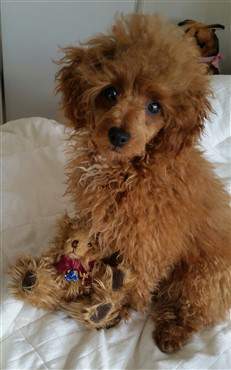
Bambi, 6 months old
Photo courtesy of Veronica Philogene - Melbourne Australia
And this can cause a puppy or dog to do the ‘grabbing’ first. It is almost like a game.
Ahead we will discuss methods to help a Poodle with these issues.
Is it Dangerous for a Poodle to Eat Feces?
Dogs can get sick from this. The degree of how sick a Poodle can get by eating feces depends on the circumstances:
Getting sick from eating his own feces:
In some cases, he can get sick. If a Poodle was recently de-wormed, he can re-infect himself with worms again if his body is shedding worms and eggs into his feces. If a Poodle were to eat quite a bit of his own feces, this can could cause upset stomach
and/or digestive distress, particularly if he is eating indigestible food, eliminating it, ingesting it again, eliminating it again and so forth. It can be a vicious cycle. Finally, if a Poodle is eating his own poop due to being fed a low quality diet, the long-term health effects of a diet lacking in proper nutrition will take its toll.
Getting sick from eating the feces of other dogs:
This is even more dangerous. There are many parasites and disease that a Poodle can catch if he ingests the feces of other dogs. Some of the strong concerns include:
- Whipworms
- Hookworms
- Roundworms
- Tapeworms
- Parvo
- Corona
- Giardiasis
- Salmonellosis
- Cryptosporidiosis
- Campylobacteriosis
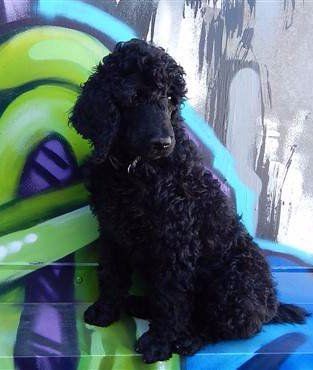
Moja-fett (Mojo), at 11 weeks old
Photo courtesy of Lynne Bolton - San Diego
Getting sick from eating cat poop:
In household where there is a Poodle and a cat/s, this brings about a whole new issue of the Poodle eating the cat’s poop. After all, it is usually there in the litter box and very accessible to a dog.
There are some concerns, including:Clostridia
- Salmonella
- Campylobacter
Medical Conditions that can Cause Coprophagia
There are some health conditions and illness that can cause coprophagia, however in most cases other symptoms of that condition or illness will be seen.
Anemia
– This is a deficiency of iron. Some dogs may not show any signs at all, and this is only caught during a vet visit. In moderate to severe cases there may be tiredness, exercise intolerance, decreased appetite and/or pale gums.
Diabetes
- Other signs include excessive thirst, increased urination, weight loss despite normal and/or increased food consumption.
Inflammatory bowel disease
- Other signs include vomiting, diarrhea, loss of appetite, weakness and/or fever. These symptoms may come and go.
Intestinal parasites
- Since some parasites can rob a dog of nutrients, he may then turn to start to eat stool and eating stool can cause a dog to catch parasites. For this reason, it is recommended for a Poodle to have a stool test 2 times per year (every 6 months) at the vet’s office.
Neurological disease
- There are a wide range of neurological diseases and symptoms will vary. Coprophagia will not be the most obvious sign, it will be just. In general, such things as: stumbling, excessive head shaking, trembling, dragging the paws, eye flickering and blank stares are signs that there is a neurological problem.
Thyroid disease
– Other signs may include skin and coat issues
(dull, dry or peeling skin, shedding or thinning coat), possible black patches on the skin, weight gain, muscle loss, lethargy, unhealthy nails, intolerance to cold.
Vitamin deficiency/ Malnutrition
- High quality dog foods will contain the vitamins and minerals that a Poodle needs to stay healthy. And if you are home cooking for your Poodle, it’s always recommended to add on a full and complete vitamin and mineral canine supplement each day.
Other signs of this include poor coat, dry skin, itching, sores, teeth issues (bad breath, swollen gums), bowel movement issues (frequent stools or constipation, foul smelling stools, excessively large stools), lack of muscle tone, allergies, lack of energy, behavioral problems (in addition to eating poop) such as anxiety, hyperactivity and or eating other inappropriate items.
Exactly How to Stop a Poodle from Eating Feces
1.Reassess Meals and Snacks
There are a lot of different dog food brands and sometimes owners chose what is most convenient (it is offered at the supermarket or local pet supply store), what is a ‘common’ name (owners see a well-known brand and assume it must be good, though many popular brands are only 2 star foods) or what is easy on the budget (good foods that can prevent coprophagia by being filler-free, easily digestible and provide enough vitamins, minerals and nutrients will not be exorbitantly priced, but may run a bit higher).
While this is not all-inclusive, here is list of common dog food fillers (if your Poodle is eating a brand that contains any of these, it is time to choose something different):
- Animal Digest: As with fat, is particularly bad if the animal is not specified.
- Animal Fat: Only when the ‘animal’ is not named. In these cases, it can be ANY animal including diseased, dying, road kill, euthanized animals, etc.
- Beef Tallow
- Brewers Rice
- Byproduct – Any ingredient with byproduct, including chicken, beef byproduct, etc. This refers to body parts unfit for human consumption with includes necks, feet, bones, intestines, eggs, genitals, etc.
- Cereal Food Fines
- Corn bran
- Corn Distillers
- Dried Grains with Soluble
- Feeding Oat Meal
- Glutens: Corn or wheat gluten
- Hulls - Any ingredient with ‘hulls’: Oat, peanut, rice hulls, etc.
- Lard
- Meal - Any ingredient with ‘meal’: Soybean, fish, corn, liver, meat & bone, meat, blood, pork, poultry meal, etc.
- Phosphoric Acid
- Potato Product
- Soybean Mill Run
- Soy Flour
- Wheat Mill Run
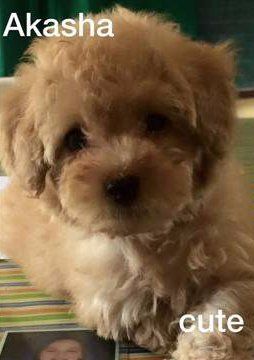
Akasha, 2 months, 20 days
Photo courtesy of Julie Esguerra
This is a list of coloring and preservatives to keep from your Poodle (these do not lead to eating feces but can cause terrible allergies)
- BHA
- BHT
- Ethoxyquin
- Propyl Gallate
- Blue 2
- Red 40
- Yellow 5
- Yellow 6
2. Limit Exposure
Outside
- If your Poodle eats his own feces from the yard, strict supervision must be given and stool should be picked up and disposed of as it is deposited. There are a surprisingly large number of owners who ask for help with Poodles that dig up the yard, ingest pebbles and eat poop outside when they are allowed to go out a doggie dog and are there unsupervised. Therefore, the answer is rather straightforward: Canines are inquisitive creatures and will get into trouble when let out alone.
Additionally, make it a practice to have your Poodle on leash when taken out. This way, the puppy or dog can be controlled and lead away from feces before he has a chance to ingest it.
It can also be tremendously helpful to teach the ‘Leave it’ command to your puppy or dog. It can come in handy in many situations.
Inside, when home alone
– This is one of the trickier situations as you are not there to control what your Poodle does. Some tips ahead of additions to food can help in these cases. Additionally, you’ll want to take steps to reduce the stress of separation anxiety.
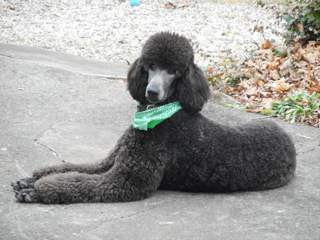
Yogi, at 11 months old
Photo couresty of Jim and Lucy Sidey
Eating cat poop
– It is best to place the litter box up on an area that the cat can reach, but the Poodle cannot. A popular spot is on top of the washer or dryer. Another helpful tip (this works best with miniature or standard sized Poodles) is to place the litter box inside of a sturdy Rubbermaid container, making a cut out that the cat can fit through, but the dog cannot.
Eating feces of other dogs
- This is perhaps the easiest issue to prevent and it all comes down to closely watching your Poodle when in the company of other dogs. Keeping your Poodle on leash and harness not only stops him from being able to sniff and ingest feces of other dogs, but keeps him safe from unfriendly dogs, running away and being injured in an endless number of ways.
As mentioned above, making sure your Poodle has the ‘Leave it” command down pat can really help.
And particularly if you have your Poodle at a dog park and he is off leash, this command can be shouted out from a distance.
3. Prevent misunderstanding that feces are of interest.
Anytime that you are cleaning up your Poodle’s bowel movement, do this in a calm manner. Even if your puppy has an accident in the house during housebreaking, do not speak in excited tones that may inadvertently imply that the stool holds importance. Do reward going to the bathroom in a designated area, however the act of walking to the stool and picking it up should be done inconspicuously.
4. Additives or Supplements
There are several home remedies for stopping coprophagia with dogs and here is the thing: Most work (to varying degrees), but only for some dogs. You will need to experiment to see which of the following works for your particular Poodle. In general, it is safe to say that each element works for 30 to 50% of dogs. And over time, a puppy or dog may begin to build up a tolerance for that element, at which time you will need to seek an alternative one.
Let’s look at each one to see which ones may work and which do not (with our rating system of 1 through 5 stars):
Additives-
★Hot sauce – While some owners try, this should NOT be put on a dog’s food. It can burn their mouth and tongue and make them afraid of their dish. When this is mentioned as a cure, it is in regard to this being poured over old feces that are already in the yard. For the time that it takes to put this on poo, you can just as easily pick up that poo and dispose of it. Some claim that it works by allowing a dog to attempt to eat the poo/hot sauce, thus making them afraid to ever try to eat it again. However, this can be considered unethical and other treatments do work better.
★★Pineapple- This is one of the fruits that a Poodle can safely eat. It contains a good amount of manganese and vitamin C. It is high in sugar, however the fiber content of pineapple makes it digest slowly, thus in moderation it is just fine to give to a dog.
It also contains a proteolytic enzyme called bromelain. And bromelain aids in the absorption of protein and helps digestion. It is this element that is thought to be the reason why pineapple can help stop coprophagia.
For puppies, you will want to offer 2 chunks of pineapple into each meal (you can slice the chunks in two). For adult toys, 2 chunks per meal is sufficient. For adult miniature Poodles, 3 chunks per meal and for full grown standard sized Poodles, 4 to 5 chunks per meal is best. You can also use crushed pineapple, doling this out with a spoon to equal the above equivalent.
★★Meat tenderizer
– The way in which meat tenderizer is said to help stop a dog from eating feces is due to the papain found in it. Papain is a protein-digesting enzyme obtained from unripe papaya fruit. In addition to tenderizing meat, it also is said to aid in digestion.
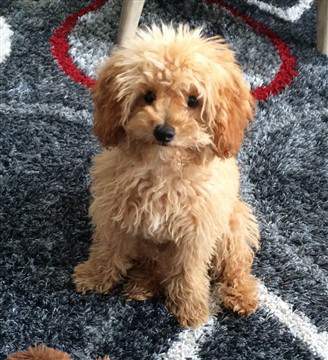
Milo, 5 months old
Photo couresty of Shiva
Some claim that the papain causes feces to taste really bad, however this is not proven and it is most likely its digestive qualities that produces positive results.
A word of caution
– Many meat tenderizers also contain MSG (Monosodium glutamate) which is classified as being ‘safe for consumption’ for humans, but is not without controversy. Many people complain of a vast array of symptoms including: headache, flushing (hot spell), sweating, facial numbness, numbness in extremities, cheat pain, nausea and/or weakness. For this reason, we recommend avoiding any that contain MSG.
***
One brand that is safe, with no MSG at all, is ★★★Adolph's meat tenderizer and it does contain the Papain that can help coprophagia issues.
★★Pumpkin
– Pumpkin (canned real fruit, not the pie filling) has long been an at-home treatment for dogs in regard to vomiting, diarrhea and other intestinal distress. Some claim that this works to stop a dog from eating his stools. However, just like the papain and pineapple, the reason for working with some Poodles is due to helping the digestive tract move along as it should.
Supplements –
There are several popular canine supplements intended to treat coprophagia. As mentioned, some do work very well for some Poodles. They are meant to taste just fine (or are tasteless) going in, but then make bowel movements taste really horrible. Since these are not costly, they are worth trying. Here are the most popular ones in order of rating (with our rating system of 1 through 5 stars):
★ Forbid
- This is a purified protein feed, that causes an unappetizing taste to stool as it is travels through a dog’s digestive tract. Its active ingredients are Wheat Gluten, Monosodium Glutamate (MSG). As mentioned above, MSG is controversial and may cause unwanted and negative reactions.
★ Deter
- These are chewable tablets with the active ingredients of Monosodium Glutamate (MSG) and Oleoresin Capsicum (this is the base ingredient of pepper spray but is also used as a food additive in spicy foods). Not recommended due to the MSG.
★★★ Potty Mouth
- This has no MSG. The ingredients are Brewers Yeast, Cayenne, Biotin, Vitamin B1, Vitamin B2, Vitamin B6 Niaciamide, Iron and Copper. These are easily chewable tablets and reasonably priced.
★★★★ NaturVet Coprophagia Deterrent Soft Chews
– These are all natural chews and work very well for many dogs. Active ingredients are Yucca Schidigera, Parsley Leaf, an Enzyme Blend and Chamomile.
It also contains Brewer’s Dried Yeast, Canola Oil, Dried Potato Product, Flaxseed, Glutamic Acid, Glycerin, Lecithin, Mixed Tocopherols, Natural Flavoring, Rosemary Extract, Sorbic Acid, Tapioca Starch, Vegetable Oil, and Water.
What’s great about this product is that one variety of it also works to freshen a dog’s breath, which is always a plus.
Summary
Trying to stop a Poodle from eating feces is not always easy, however it can be done. Most cures do not work overnight; some time must be given in most cases, so patience is needed. Most often, it is not just one element that will cure this, it is a matter of doing several things at the same time:
Making sure your puppy
or dog is eating top-notch food, limiting access to feces and taking steps to combat boredom and stress such as separation anxiety will help. Adding certain foods (pineapple, pumpkin, meat tenderizer without MSG) can help as does some of the better coprophagia supplements such as the NaturVet’s Deterrent chews.
